ARQ Wealth Advisors Q2 2023 Commentary: Bucking the Trend
By Richard Siegel, CFP®
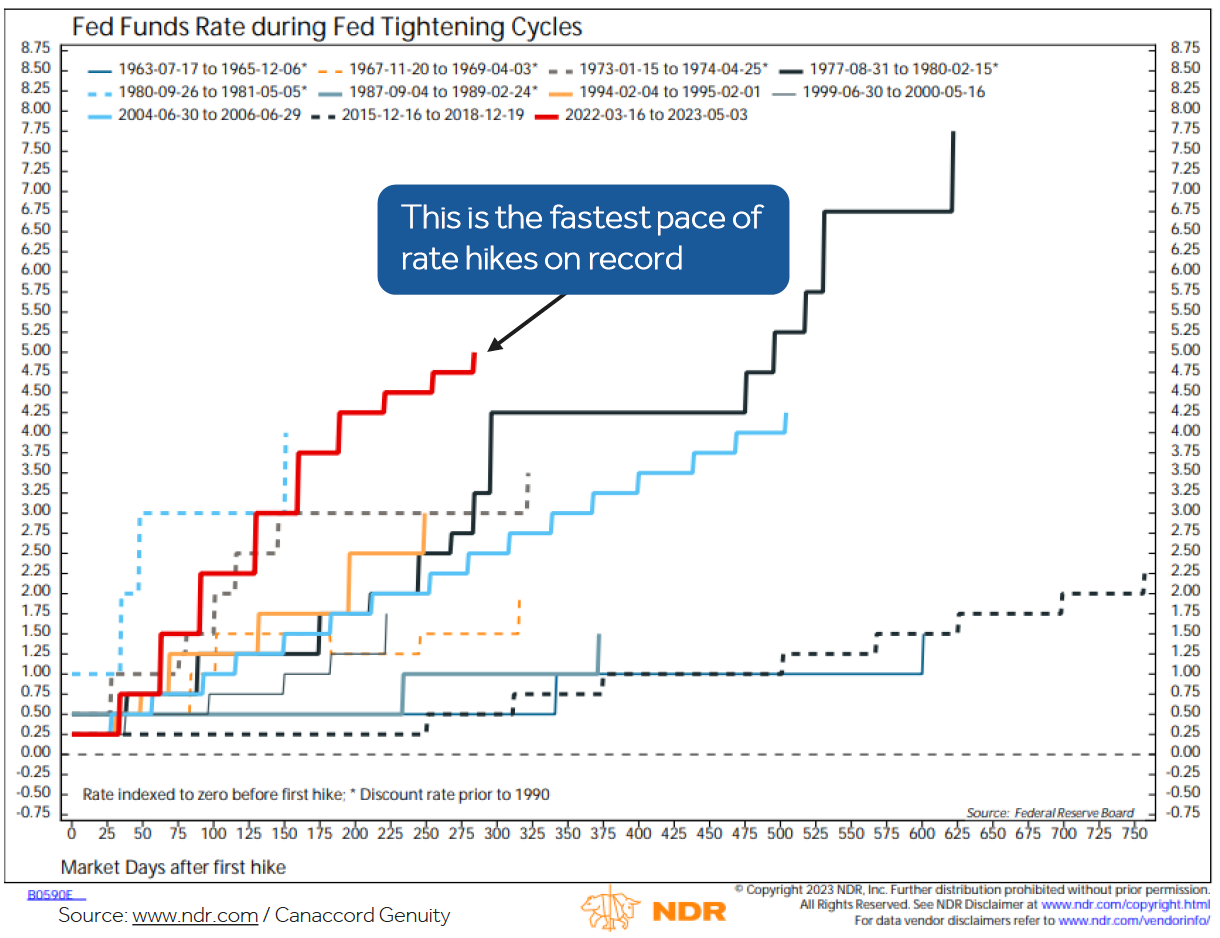 Although we have been positioned for one of the most telegraphed recessions in history, we have still participated nicely in this year’s surprise equity market strength. We are all bearing witness to the fastest rate hiking cycle in history, as the Fed continues to battle its number one enemy – inflation. Typically, stocks do not respond well to rapidly rising interest rates and last year’s market performance proved that out. This year, rates have continued to climb, albeit at a much slower pace. Additionally, the Fed is now forecasted to raise the funds rate 2 more times this year. This high cost of capital is problematic for corporate profits, mortgage rates, and apparently regional banks, so forgive us if we haven’t bought in to the recent market euphoria. A stubborn labor market has caused resilience in consumer spending and therefore the elusive 2023 recession may be on hold for the time being.
Although we have been positioned for one of the most telegraphed recessions in history, we have still participated nicely in this year’s surprise equity market strength. We are all bearing witness to the fastest rate hiking cycle in history, as the Fed continues to battle its number one enemy – inflation. Typically, stocks do not respond well to rapidly rising interest rates and last year’s market performance proved that out. This year, rates have continued to climb, albeit at a much slower pace. Additionally, the Fed is now forecasted to raise the funds rate 2 more times this year. This high cost of capital is problematic for corporate profits, mortgage rates, and apparently regional banks, so forgive us if we haven’t bought in to the recent market euphoria. A stubborn labor market has caused resilience in consumer spending and therefore the elusive 2023 recession may be on hold for the time being.
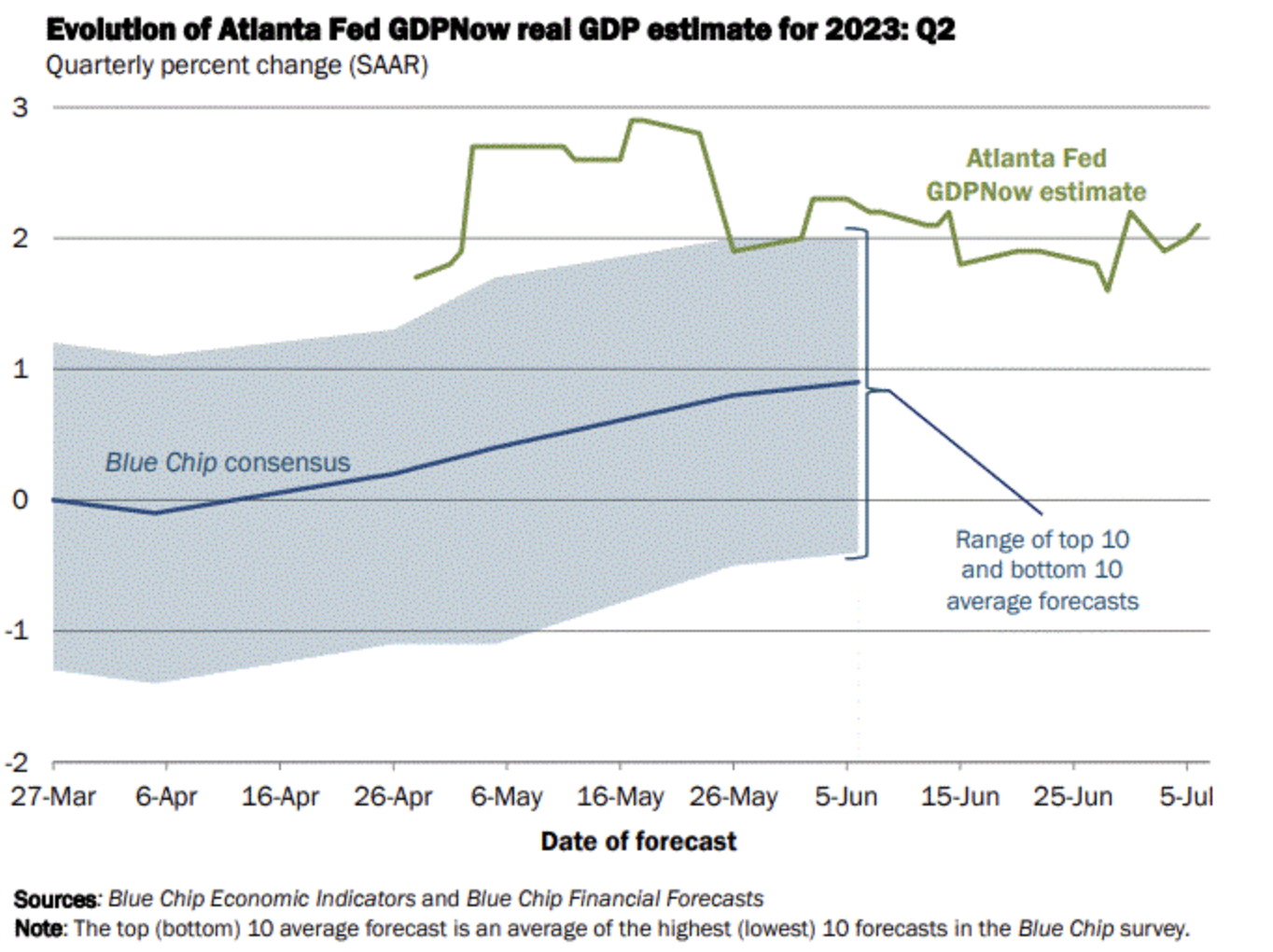
We see three different scenarios playing out in the next several months: 1) we avoid a near-term recession, and the Fed is able to engineer the almost impossible soft landing 2) We experience a shallow recession, which most investors and businesses are well prepared for. There will be some economic damage, but overall, a relatively benign outcome. 3) Not only does the Fed keep rates higher for longer than originally anticipated, but it keeps its foot on the gas, eventually causing a deeper recession brought on by a credit crisis.
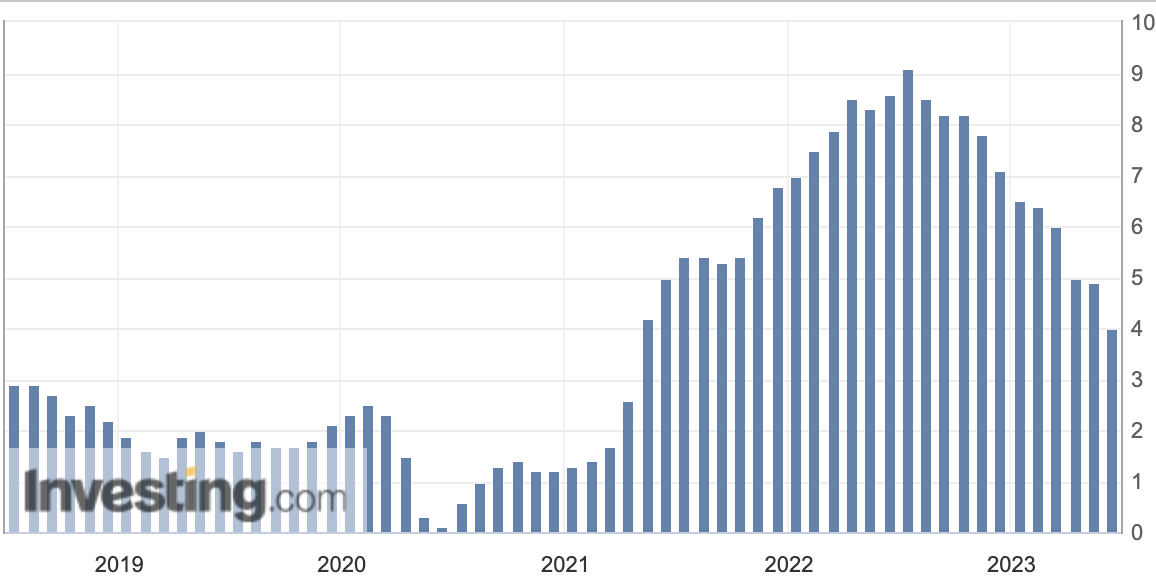 The first reading of economic output for the 2nd quarter will be released on July 27th and by all accounts the U.S. economy continues to grow at a meager pace, but nowhere close to a recessionary environment.
The first reading of economic output for the 2nd quarter will be released on July 27th and by all accounts the U.S. economy continues to grow at a meager pace, but nowhere close to a recessionary environment.
So now let’s see if the Fed’s aggressive monetary policy has worked to reduce the highest inflation level in over 40 years; so far so good. Supply chains have done an about face back to pre-Covid levels and higher interest rates have begun to lower demand for goods, causing prices to trend lower. Headline CPI has fallen from 9% to 4%. The Fed’s preferred inflation gauge is the PCE (Personal Consumption Expenditure), which recently peaked in June 2022 at 7%, is currently sitting at 3.8%, and the Fed’s target is 2%; so trending in the right direction.
Equity Markets Overview
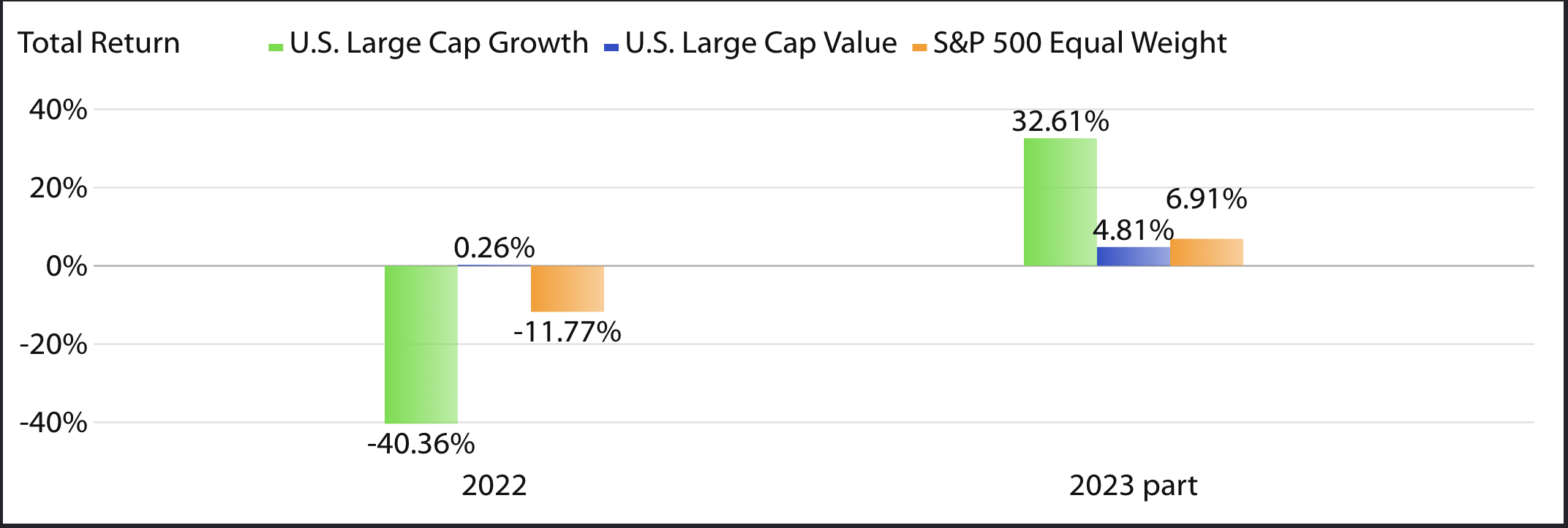 This year’s equity market returns have once again been quite bifurcated. Almost the entire return of the S&P 500 Index has come from a small group of technology stocks; the same ones that got crushed in 2022. The newly dubbed “Magnificent 7” are Nvidia, Tesla, Meta Platforms, Apple, Amazon.com, Microsoft, and Alphabet. The renewed attention these stocks have gotten has come from the hype around the artificial intelligence movement. Although our client portfolios have exposure to these stocks, we are not overweighted in them. Shockingly, these 7 stocks out of the 500 holdings in the S&P 500, currently make up a whopping 27.5% of the entire weighting of the index. Here in lies the problem with cap-weighted indexes; they can lack diversification, which can cause boom and bust-like returns. You can see from the chart to the right that these growth stock versus value stocks basically flip-flopped over the past 18 months. Interestingly, the equal-weighed S&P 500 index (all stocks have equal representation) had smoother returns over the same time period. Even more surprising, is the chart below, which is the exact same chart above, just now shown in linear format; the fantastic performance of these growth companies in recent months still doesn’t make up for their devastating losses from last year. The takeaway – if you swing for the fences, you’ll strike out a lot. We prefer singles and doubles.
This year’s equity market returns have once again been quite bifurcated. Almost the entire return of the S&P 500 Index has come from a small group of technology stocks; the same ones that got crushed in 2022. The newly dubbed “Magnificent 7” are Nvidia, Tesla, Meta Platforms, Apple, Amazon.com, Microsoft, and Alphabet. The renewed attention these stocks have gotten has come from the hype around the artificial intelligence movement. Although our client portfolios have exposure to these stocks, we are not overweighted in them. Shockingly, these 7 stocks out of the 500 holdings in the S&P 500, currently make up a whopping 27.5% of the entire weighting of the index. Here in lies the problem with cap-weighted indexes; they can lack diversification, which can cause boom and bust-like returns. You can see from the chart to the right that these growth stock versus value stocks basically flip-flopped over the past 18 months. Interestingly, the equal-weighed S&P 500 index (all stocks have equal representation) had smoother returns over the same time period. Even more surprising, is the chart below, which is the exact same chart above, just now shown in linear format; the fantastic performance of these growth companies in recent months still doesn’t make up for their devastating losses from last year. The takeaway – if you swing for the fences, you’ll strike out a lot. We prefer singles and doubles.
 Shifting gears, let’s talk about small cap stocks. Over the long run, small caps have outperformed their large cap brethren, but with more risk and volatility. Overall, they have underperformed in recent years, but 2023 started with significant small-cap outperformance until the Silicon Valley Bank news broke in March; regional banks represent a larger weight in small-cap indexes than in large-cap indexes. At present, the valuation gap between small caps and large caps is near the largest since the tech bubble over two decades ago. Since 1978, the inception of the Russell 2000 index, whenever the index delivers returns below 5% per annum over a 5-year period (currently the case), subsequent three-year periods had positive returns 100% of the time and averaged 17.7% per year. This perhaps represents one of the best opportunities in the equity markets we’ve seen in quite a while.
Shifting gears, let’s talk about small cap stocks. Over the long run, small caps have outperformed their large cap brethren, but with more risk and volatility. Overall, they have underperformed in recent years, but 2023 started with significant small-cap outperformance until the Silicon Valley Bank news broke in March; regional banks represent a larger weight in small-cap indexes than in large-cap indexes. At present, the valuation gap between small caps and large caps is near the largest since the tech bubble over two decades ago. Since 1978, the inception of the Russell 2000 index, whenever the index delivers returns below 5% per annum over a 5-year period (currently the case), subsequent three-year periods had positive returns 100% of the time and averaged 17.7% per year. This perhaps represents one of the best opportunities in the equity markets we’ve seen in quite a while.
 Another asset class that continues to look attractive is foreign stocks. Both developed and emerging markets have much more compelling valuations than large cap U.S. stocks. Foreign stocks also benefit from a weakening dollar. After the USD climbed to multi-year highs in 2022, it has been on a downward trajectory. Since the U.S. has taken the lead globally with rate hikes, we’ll most likely be the first major economy to lower rates as well. This eventual pivot in monetary policy will likely cause the dollar to weaken further. Emerging markets have been afflicted by Covid reopening issues, but developed foreign markets (Europe & Japan) have outperformed U.S. markets since the dollar’s cycle peak in September 2022.
Another asset class that continues to look attractive is foreign stocks. Both developed and emerging markets have much more compelling valuations than large cap U.S. stocks. Foreign stocks also benefit from a weakening dollar. After the USD climbed to multi-year highs in 2022, it has been on a downward trajectory. Since the U.S. has taken the lead globally with rate hikes, we’ll most likely be the first major economy to lower rates as well. This eventual pivot in monetary policy will likely cause the dollar to weaken further. Emerging markets have been afflicted by Covid reopening issues, but developed foreign markets (Europe & Japan) have outperformed U.S. markets since the dollar’s cycle peak in September 2022.
Bond Market Overview
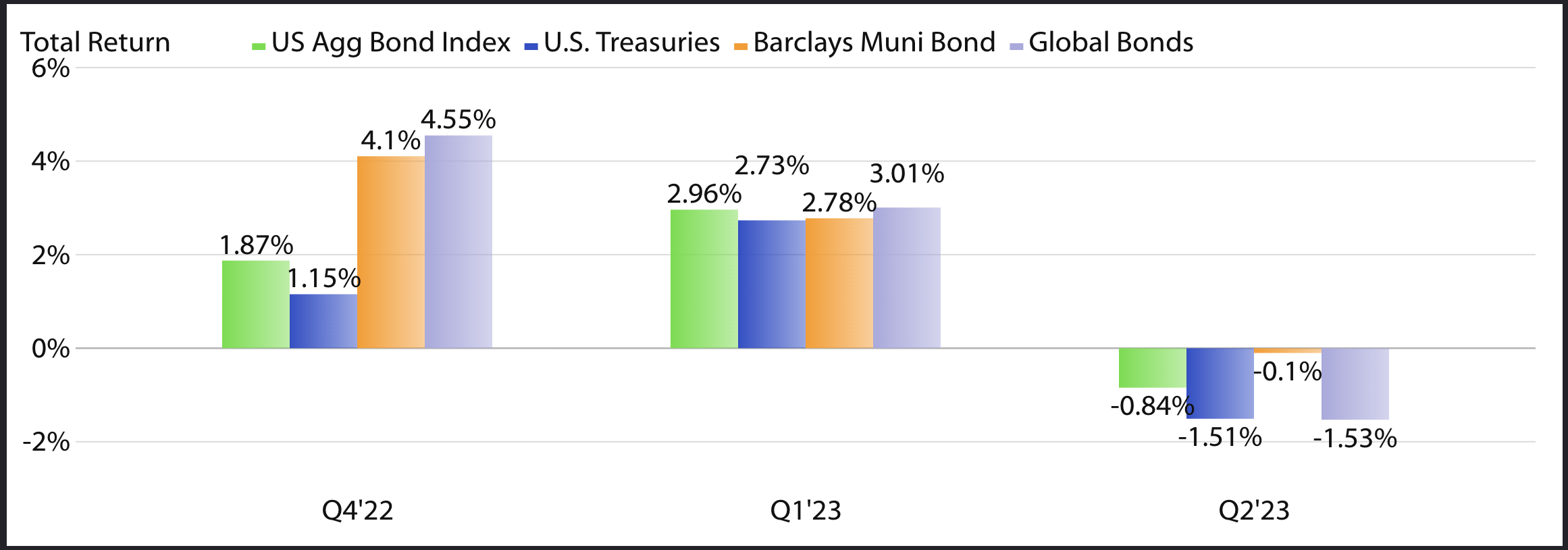 After 2 consecutive quarters of strong bond returns, bonds faltered in Q2, 2023. The simple reason for this was a reacceleration of bond yields. With the exception of the Fed Funds rate, Treasury yields across the curve, collapsed earlier in the year, predicting that the Fed would have to cut rates by the end of 2023 due to the regional bank “mini crisis.” Well, with stronger than expected economic data, the Fed has telegraphed two more rate hikes this year, forcing rates to once again turn up and bond prices to drop.
After 2 consecutive quarters of strong bond returns, bonds faltered in Q2, 2023. The simple reason for this was a reacceleration of bond yields. With the exception of the Fed Funds rate, Treasury yields across the curve, collapsed earlier in the year, predicting that the Fed would have to cut rates by the end of 2023 due to the regional bank “mini crisis.” Well, with stronger than expected economic data, the Fed has telegraphed two more rate hikes this year, forcing rates to once again turn up and bond prices to drop.
Due to our defensive posturing, our overweight to medium grade corporate debt, and our holdings in non-traditional alternatives, our bond holdings eked out a small gain for Q2.
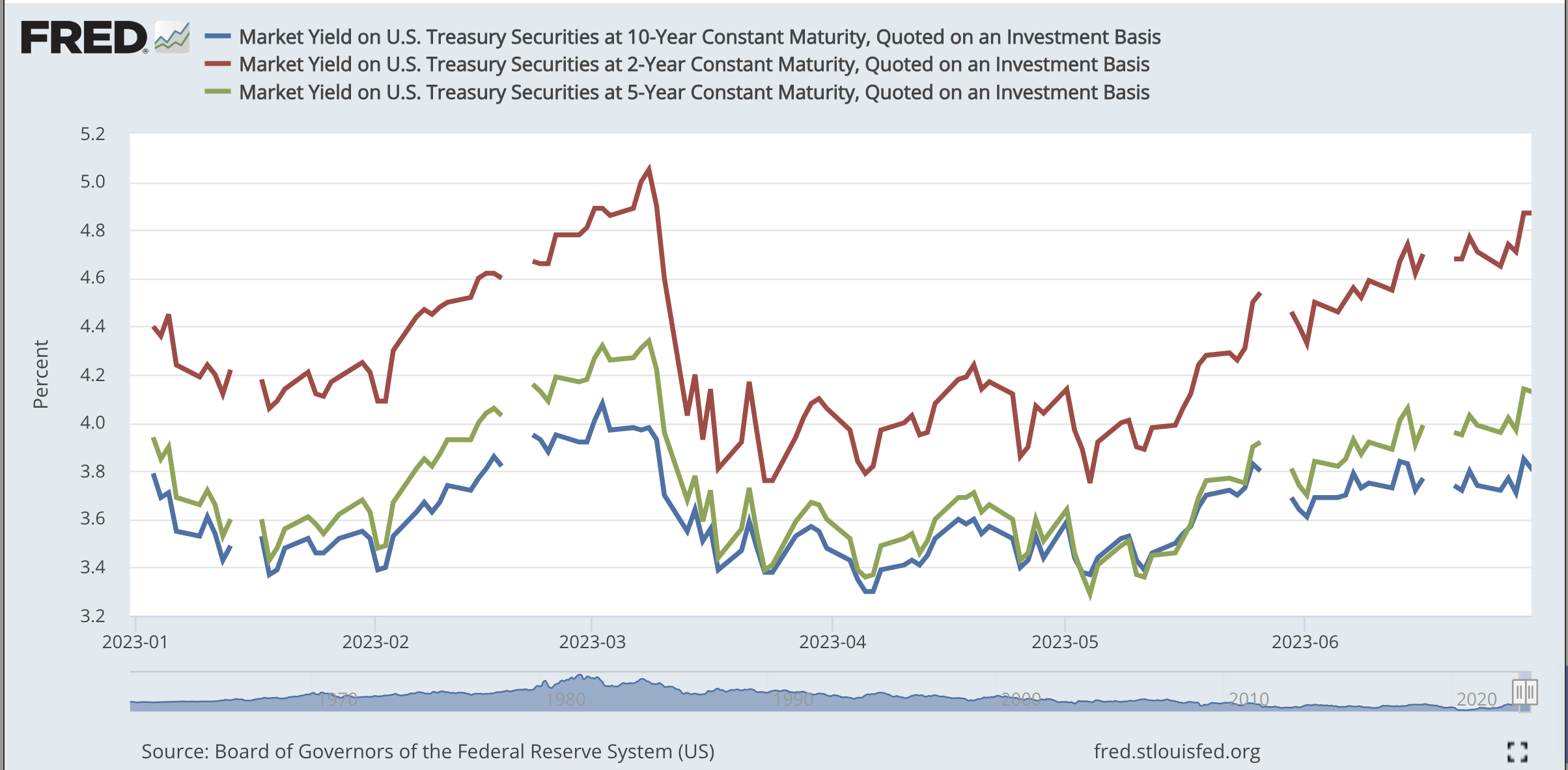 We continue to be quite positive on the bond market. Yields account for the vast majority of the returns on bonds. Short-term volatility in yields will move prices around, but over time, yields determine the total return outcome. At present, the chart to the right illustrates yields on various fixed income asset classes. Essentially, we’re almost sitting at 10-year highs. The return opportunity in bonds today is literally more than twice what it’s been over the past decade.
We continue to be quite positive on the bond market. Yields account for the vast majority of the returns on bonds. Short-term volatility in yields will move prices around, but over time, yields determine the total return outcome. At present, the chart to the right illustrates yields on various fixed income asset classes. Essentially, we’re almost sitting at 10-year highs. The return opportunity in bonds today is literally more than twice what it’s been over the past decade. 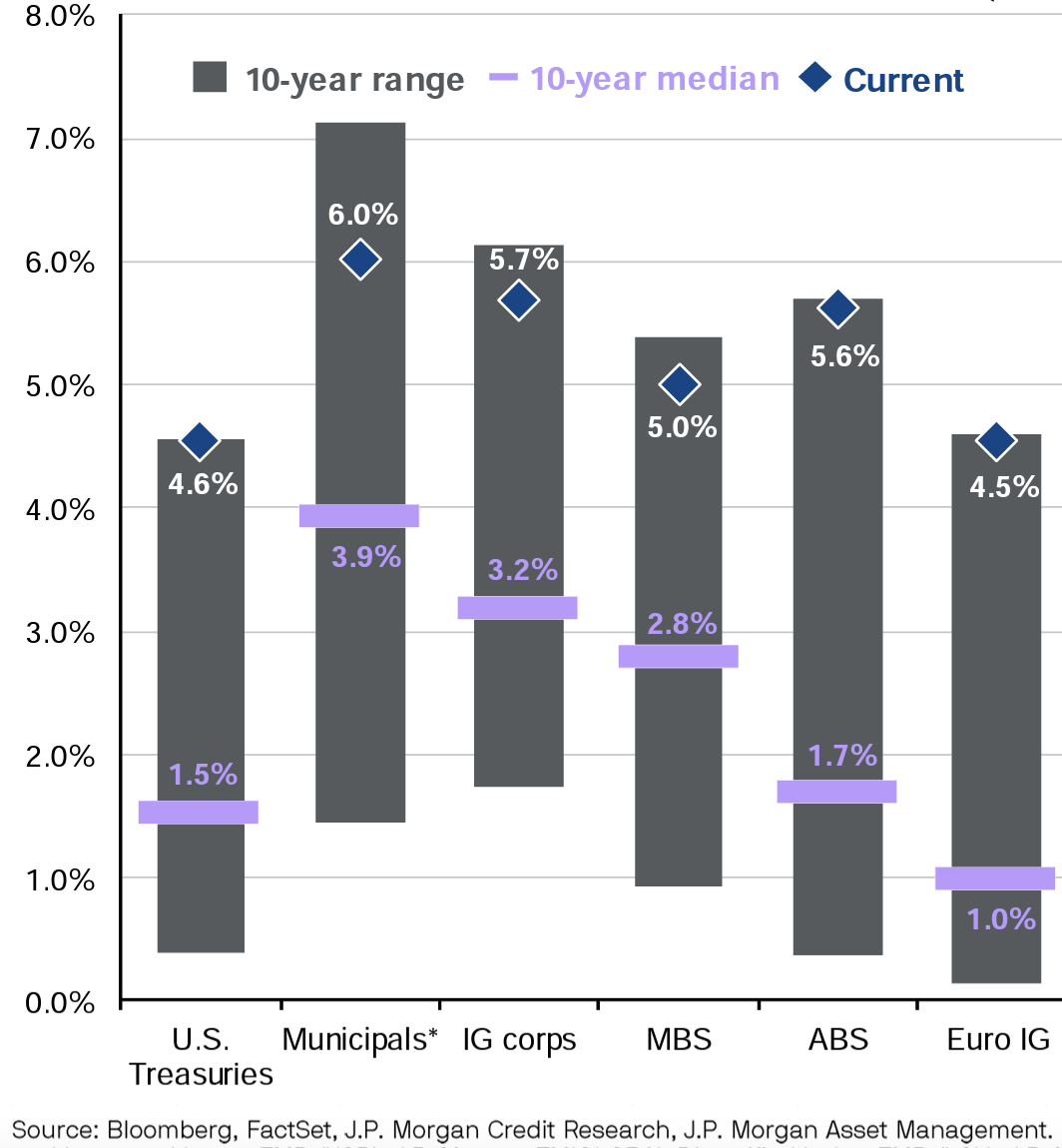
It certainly feels that the economy and markets are at an inflection point. There are a variety of very compelling reasons that the U.S. will enter into recession in the next several months including a deeply inverted yield curve, stress on the credit system, and a Fed that is blatantly saying it is willing to cause some pain to get inflation back down to its 2% target. On the other hand, nothing that has occurred over the past 3.5 years since the start of the pandemic has been typical, normal or based on a reliable playbook. Thus far, corporate earnings have been surprising resilient, the job market remains strong, the housing market has stabilized, and the U.S. consumer has been able to manage around an inflationary regime. Maintaining a slightly defensive asset allocation in client portfolios with a focus on attractive equity valuations, high bond yields, and a cash position earning almost 5% is a playbook that we believe is the winning game plan.


